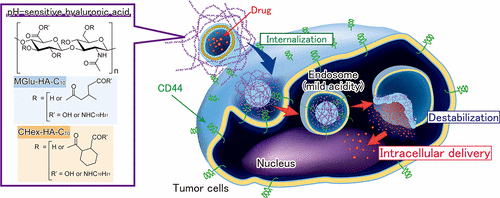当前位置:
X-MOL 学术
›
Bioconjugate Chem.
›
论文详情
Our official English website, www.x-mol.net, welcomes your
feedback! (Note: you will need to create a separate account there.)
Hyaluronic Acid-Based pH-Sensitive Polymer-Modified Liposomes for Cell-Specific Intracellular Drug Delivery Systems
Bioconjugate Chemistry ( IF 4.0 ) Pub Date : 2017-12-12 00:00:00 , DOI: 10.1021/acs.bioconjchem.7b00551 Maiko Miyazaki 1 , Eiji Yuba 1 , Hiroshi Hayashi 2 , Atsushi Harada 1 , Kenji Kono 1
Bioconjugate Chemistry ( IF 4.0 ) Pub Date : 2017-12-12 00:00:00 , DOI: 10.1021/acs.bioconjchem.7b00551 Maiko Miyazaki 1 , Eiji Yuba 1 , Hiroshi Hayashi 2 , Atsushi Harada 1 , Kenji Kono 1
Affiliation

|
For the enhancement of therapeutic effects and reduction of side effects derived from anticancer drugs in cancer chemotherapy, it is imperative to develop drug delivery systems with cancer-specificity and controlled release function inside cancer cells. pH-sensitive liposomes are useful as an intracellular drug delivery system because of their abilities to transfer their contents into the cell interior through fusion or destabilization of endosome, which has weakly acidic environment. We earlier reported liposomes modified with various types of pH-sensitive polymers based on synthetic polymers and biopolymers as vehicles for intracellular drug delivery systems. In this study, hyaluronic acid (HA)-based pH-sensitive polymers were designed as multifunctional polymers having not only pH-sensitivity but also targeting properties to cells expressing CD44, which is known as a cancer cell surface marker. Carboxyl group-introduced HA derivatives of two types, MGlu-HA and CHex-HA, which have a more hydrophobic side chain structure than that of MGlu-HA, were synthesized by reaction with various dicarboxylic anhydrides. These polymer-modified liposomes were stable at neutral pH, but showed content release under weakly acidic conditions. CHex-HA-modified liposomes delivered their contents into CD44-expressing cells more efficiently than HA-modified or MGlu-HA-modified liposomes or unmodified liposomes, whereas the same liposomes were taken up only slightly by cells expressing CD44 proteins less. Competition assay using free HA or other polymers revealed that HA derivative-modified liposomes might be recognized by CD44. Therefore, HA-derivative-modified liposomes are useful as cell-specific intracellular drug delivery systems.
中文翻译:

基于透明质酸的pH敏感聚合物修饰的脂质体,用于细胞特异性细胞内药物递送系统
为了增强抗癌药在癌症化学疗法中的治疗效果并减少其副作用,必须开发出具有癌症特异性和癌细胞内控释功能的药物递送系统。pH敏感的脂质体可用作细胞内药物传递系统,因为它们具有通过弱酸性环境的内体融合或不稳定来将其内含物转移到细胞内部的能力。我们先前报道了脂质体,这些脂质体是基于合成聚合物和生物聚合物的各种类型的pH敏感聚合物改性的,作为细胞内药物递送系统的载体。在这项研究中,基于透明质酸(HA)的pH敏感聚合物被设计为多功能聚合物,不仅对pH敏感,而且对表达CD44的细胞具有靶向特性,而CD44被称为癌细胞表面标记。通过与各种二羧酸酐反应,合成了羧基引入的两种类型的MG衍生物,MGlu-HA和CHex-HA具有比MGlu-HA更疏水的侧链结构。这些聚合物修饰的脂质体在中性pH下稳定,但在弱酸性条件下显示出含量释放。CHex-HA修饰的脂质体比HA修饰的或MGlu-HA修饰的脂质体或未修饰的脂质体更有效地将其内容物递送至表达CD44的细胞,而相同的脂质体仅被表达较少的CD44蛋白的细胞吸收。使用游离HA或其他聚合物的竞争分析表明,HA衍生物修饰的脂质体可能被CD44识别。因此,HA衍生物修饰的脂质体可用作细胞特异性细胞内药物递送系统。
更新日期:2017-12-12
中文翻译:

基于透明质酸的pH敏感聚合物修饰的脂质体,用于细胞特异性细胞内药物递送系统
为了增强抗癌药在癌症化学疗法中的治疗效果并减少其副作用,必须开发出具有癌症特异性和癌细胞内控释功能的药物递送系统。pH敏感的脂质体可用作细胞内药物传递系统,因为它们具有通过弱酸性环境的内体融合或不稳定来将其内含物转移到细胞内部的能力。我们先前报道了脂质体,这些脂质体是基于合成聚合物和生物聚合物的各种类型的pH敏感聚合物改性的,作为细胞内药物递送系统的载体。在这项研究中,基于透明质酸(HA)的pH敏感聚合物被设计为多功能聚合物,不仅对pH敏感,而且对表达CD44的细胞具有靶向特性,而CD44被称为癌细胞表面标记。通过与各种二羧酸酐反应,合成了羧基引入的两种类型的MG衍生物,MGlu-HA和CHex-HA具有比MGlu-HA更疏水的侧链结构。这些聚合物修饰的脂质体在中性pH下稳定,但在弱酸性条件下显示出含量释放。CHex-HA修饰的脂质体比HA修饰的或MGlu-HA修饰的脂质体或未修饰的脂质体更有效地将其内容物递送至表达CD44的细胞,而相同的脂质体仅被表达较少的CD44蛋白的细胞吸收。使用游离HA或其他聚合物的竞争分析表明,HA衍生物修饰的脂质体可能被CD44识别。因此,HA衍生物修饰的脂质体可用作细胞特异性细胞内药物递送系统。


















































 京公网安备 11010802027423号
京公网安备 11010802027423号